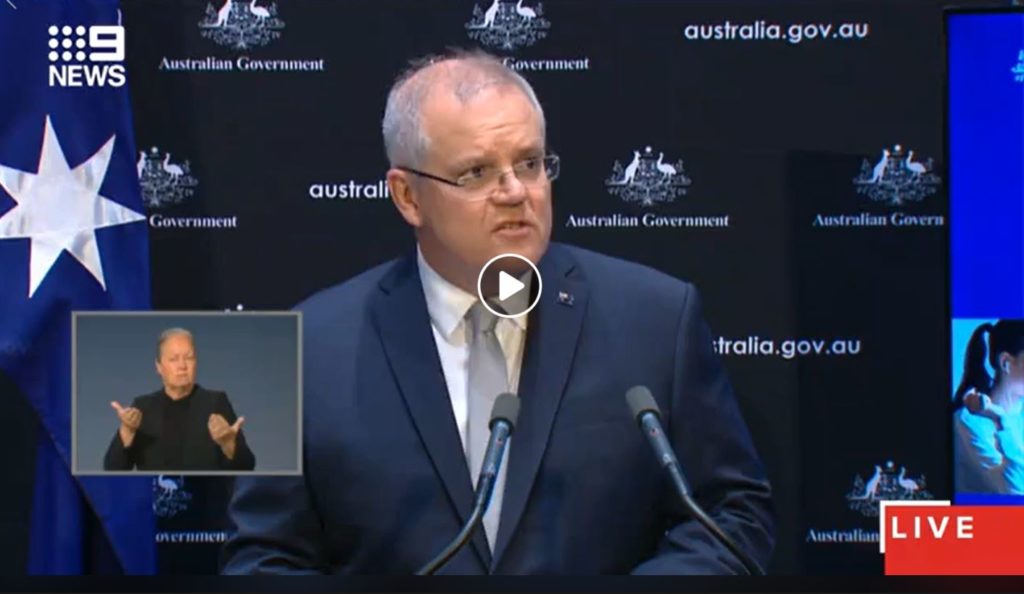The government has announced that landlords will be required to offer COVID-19-affected small businesses rent relief, while tenants must continue to honour their lease agreement.
The “Mandatory Code of Conduct” was announced by Prime Minister Scott Morrison and will be overseen by a “binding mediation process”.
The Code is applicable where the tenant has an annual turnover of less than $50 million – whether retail, commercial or industrial – and is suffering financial stress due to COVID-19.
The definition of “financial stress” is the same as for the JobKeeper Payment, being a loss (or projected loss) in Australian business revenue relative to a corresponding period in 2019.
Eligibility for Rent Relief Policy:

“Landlords will be required to reduce rent proportionate to the trading reduction in the tenant’s business, through a combination of waivers of rent and deferrals of rent,” Morrison said.
Waivers of rent must account for at least 50 per cent of the reduction in business while deferrals (delayed payments) must be amortised over the balance of the lease term and for a period of no less than 24 months, whichever is the greater.
“The landlord must not terminate the lease or draw on a tenant security. Likewise tenants must honour the lease.”
“This preserves the lease, it preserves the relationship, it keeps the tenant in the property,” the Prime Minister said, adding that it is designed to spread the financial burden while still allowing tenants and landlords to negotiate.
Eligible businesses must continue engaging employees through the JobKeeper initiative where eligible and provide rent relief to their subtenants where applicable.
Less affected businesses are expected to honour their existing lease terms and rental agreements.
Work it out:
A key message in Scott Morrison’s press conference when announcing the Code, is that tenants and landlords must come together to “work it out”. A summary of the Code’s key points are outlined below:
- Landlords must offer tenants proportionate reductions in rent payable, in the form of waivers and deferrals, based on the reduction in the tenant’s trade.
- Interim agreements should account for revenue, expenses, profitability and a reasonable recovery period.
- Rent waivers must constitute no less than 50 per cent of the total reduction in business (see examples on page 7 of the Code) and should be more if required, however regard must also be had for the landlord’s financial ability to provide such additional waivers.
- Deferrals must be amortised over the balance of the lease term or a period of no less than 24 months, whichever is the greater. No fees or punitive interest may be charged on deferrals.
- Repayment of the deferred rent should not compromise the ability of the tenant to recover from the crisis.
- Landlords must not draw on a tenant’s security for the non-payment of rent during the COVID-19 pandemic and a reasonable recovery period.
- All leases must be dealt with on a case-by-case basis, considering financial hardship due to COVID-19, along with lease structure and expiration dates.
- Tenants should be provided with an opportunity to extend their lease on existing lease terms for an equivalent period of the rent waiver and/or deferral period.
- Landlords should not increase rent (except for retail leases based on turnover rent) for the duration of the COVID-19 pandemic and a reasonable recovery period.
- Landlords cannot apply any prohibition or levy any penalties if tenants reduce opening hours or cease to trade due to the COVID-19 pandemic.
- The landlord must not seek to permanently mitigate the risk of default in negotiating temporary arrangements.
- Any reduction in statutory charges such as land tax, council rates or insurance must be proportionally passed onto the tenant.
- Landlords and tenants are required to assist each other in their respective dealings with other stakeholders including governments, utility companies, and financial institutions
All premises and commercial arrangements are different so it is not possible to form a collective industry position.
For more details, read the Code in full or click to watch Scott Morrison’s press conference below. He begins talking about commercial property just after the seven minute mark.
Banks required to support landlords:
In his press conference Scott Morrison again stated that he expects Australian and foreign financial institutions to support landlords and tenants with appropriate flexibility as they work to implement the mandatory Code.
COVID 19 – Pine Property Tenant Retention Services:
Pine Property can be engaged to assist landlords and tenants in negotiating appropriate rent relief terms and mutually beneficial outcomes.
“The new Code requires landlords and tenants to work together and negotiate an interim binding agreement,” Mr Kelleher said.
“This will require empathy and understanding from both parties and a willingness to find common ground.”
Benefits include:
- Provide both parties with security of tenure.
- No impact on current lease status protecting lessor positions and capital value.
- Ensure the lessee has assurance and clarity around agreed relief positions and structure.
- Creates an interim binding agreement on both parties providing certainty during this period
of immense uncertainty.
If you are a tenant or landlord and interested in learning more in our tenant / property retention services, please contact us.

